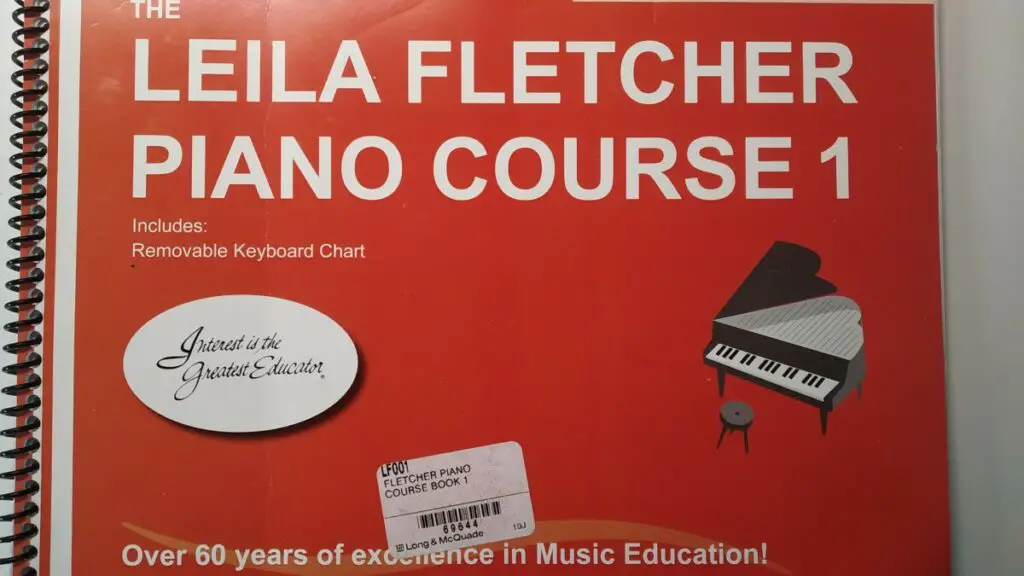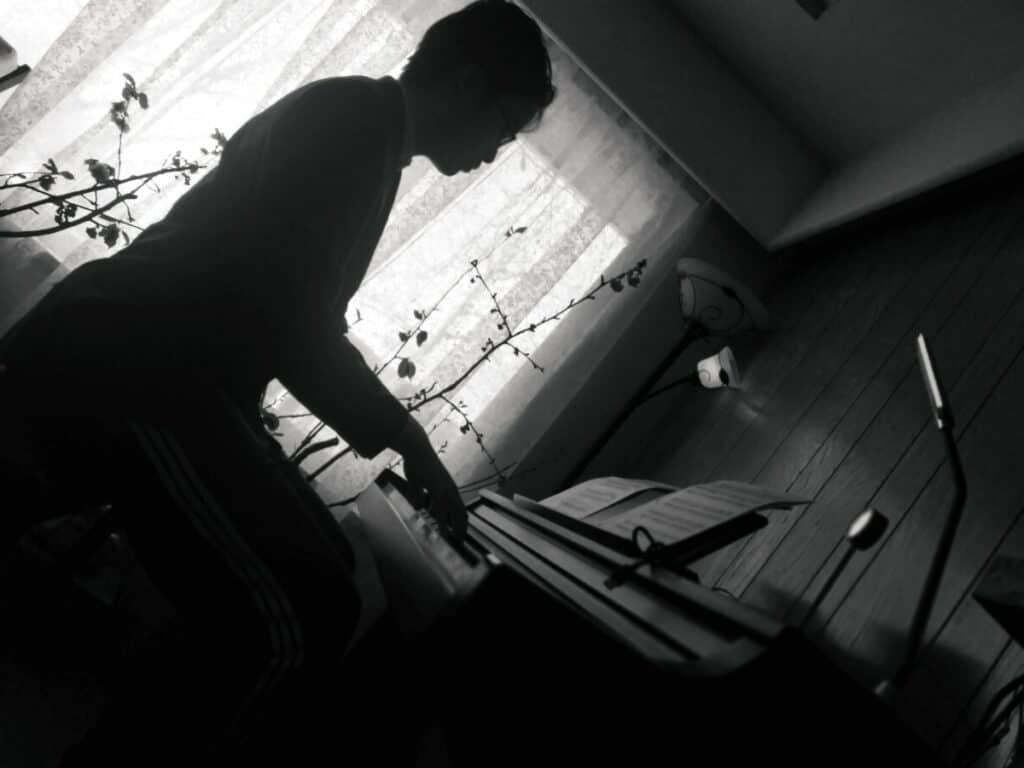This post contains affiliate links.

So you have decided to give the piano a chance. That’s great! Now you have to decide how to proceed with learning how to play it: either take piano lessons from a teacher or teach yourself. But which one is the better, or more importantly, the more suitable option for you?
Taking piano lessons from a teacher is better than teaching yourself if you are serious about playing the piano since piano teachers can help develop the necessary forms and techniques needed for harder, more complicated piano pieces.
With that said, there are scenarios where you may want to teach yourself in order to cut costs on lessons. This article will go through the pros and cons of piano lessons and teaching yourself, along with some factors to consider to determine which option is better for you.
I’ll also give you a few tips on what to learn if you do decide to teach yourself the piano and explain why in the end, having a piano teacher is more beneficial to you if you’re committed to the piano, along with explaining the different options available for piano lessons.
Pros and cons of piano lessons vs teaching yourself
Here’s a table listing out the pros and cons of each option
| Piano lessons | Self-taught | |
|---|---|---|
| Pros | Learn correct forms and techniques The teacher keeps you accountable to practice piano Correct mistakes on the spot Have questions answered by the teacher immediately | Low costs Go at your own pace Freedom to learn what you want |
| Cons | Lessons from good teachers are expensive Rigid lesson structure Have to put in the time to meet your teacher’s demand | May develop improper forms and techniques Easily distracted – don’t practice enough Mistakes turn into bad habits Rely on forums for any questions |
As we can see, although teaching yourself can save you money and give you the freedom to learn what you want at your own pace, too much freedom can easily distract you, won’t give you the motivation needed to sit down and practice piano.
You also run the risk of accidentally developing improper forms and techniques, which if left alone can become bad habits that are hard to fix later down the line.
By paying for lessons, a teacher will give you weekly tasks and homework to work on, giving you a reason to practice piano along with developing proper forms to sit and techniques to use when playing the piano.
Survey result on piano lessons vs self-taught
I held a survey where I ask people if they were doing lessons (online and in-person) or teaching themselves piano. My goal was to see which was the more popular option. Here’s the result:

Out of 114 people that responded, 60 said they teach themselves, and 54 people said they take lessons.
This shows us that both options are equally popular. However, most people that chose to teach themselves piano did so because of money reasons. If you’re not on a tight budget, it’s better to invest in a good piano teacher to improve your playing.
Here’s the picture of the survey:

When is teaching yourself the right choice?
There are a few scenarios where teaching yourself is the right choice:
Beginner trying out the piano
If you are a beginner trying out the piano to see if you like it, then teaching yourself first to get your feet wet before paying to get lessons is the correct option for you.
You can use the many free piano videos on Youtube to help you get started or choose to buy a piano course to have a more structured set of instructions and steps to follow.
One of the first things a piano teacher teaches their students is how to read sheet music. Luckily, you can learn how to read sheet music by yourself. Check out my 5 Tips to Easily Teach Yourself to Read Sheet Music
This will help you save money at the beginning and if you decide that the piano isn’t for you, you can just quit it with no strings attached and move on to try another instrument.
You only want to play leisurely
If you only have a couple of favourite songs you want to play on the piano and don’t really care about proper forms and techniques like proper fingerings, effective control of your arms and wrists, correct rhythm or consistent tempo throughout the piece, then you can simply teach yourself at no cost at all.
If this is the case, you don’t even need to be able to read sheet music to start learning and playing your songs on the piano!
There are piano videos on youtube called synthesia where there is a piano keyboard at the bottom of the screen and notes falling down from the top. The length of the notes dictates how long you need to hold them.
Here’s an example of synthesia for “River Flows In You” – a very pretty and popular piano piece:
To learn how to play it, simply look at the fingering positions, copy and follow along with the recording and before you know it, you’ll be able to play your favourite songs!
Of course, if your interest runs deeper than just playing a couple of songs, then this method is highly discouraged piano sheets are the main way people in the music world communicate with each other. Thus, it’s important to be able to read and understand them.
Advanced players stopping piano lessons
Once many pianists reach an advanced level in playing piano, or they simply feel like they have achieved what they want to learn, they stop taking piano lessons.
Instead, they teach themselves whatever they want to learn next ( for example a different genre like jazz), applying the foundational skills they have built up over the course of many years.
I took private “in person” piano lessons from age 5-18. Then another year in college. Since then I teach myself anything I want to learn, typically using the same disciplined techniques and exercises I learned from my teachers
If you have been taking piano lessons for a long time and are unsure when is the right time to quit, check out When Should You Quit Taking Piano Lessons?
What to learn if you teach yourself the piano
As a brand new beginner, nothing is more important than learning how to read and understand the notations on sheet music since most of the time, you need to read the music sheet to play the piano.
Learn the different notations on a sheet: grand staff, time signatures, treble vs bass clefs, quarter notes, half-notes, etc
This is why I recommend getting a children’s piano book to start out since it’ll introduce all of these concepts while giving you simple tunes to practice immediately.
When I first started out, I used the Leila Fletcher piano book (affiliate link) and it was a very clear and beginner-friendly book. There’s a different tune on each page and an explanation on the side if there are any new concepts or notations introduced:


Once you’re familiar with piano sheets, it’s also beneficial to understand what intervals are and to learn some common chords seen in popular songs. This will help you identify when you see them in songs, making them easier to play.
Here’s a video explaining what intervals are:
Here’s a video on chords:
And while you’re at it, may as well learn how to sit and place your hands on the keyboard properly:
Why you need piano lessons in the end?
At the end of the day, if you’re serious about the piano and want to learn harder pieces or take your playing to the next level, taking piano lessons and having the expertise and guidance of a teacher is a must. Here are a few reasons why:
You get the complete learning package
A good piano teacher will make sure that you learn everything needed to be the best pianist you can be:
- Reading and understanding music sheets
- Sight reading: the ability to read from the piano sheet and play on the piano at the same time
- Ear training: the ability to identify and distinguish different notes on the piano by just hearing them. This will help when you are playing piano without sheets and you forget which key to hit next, you can imagine what the melody sound like in your head and know what note to play.
- Develop proper forms and techniques: how to sit in front of a piano, how to place your hands on the keyboard, how to use your arms and wrists to play loudly or softly, etc. All of these will allow you to add articulations and depth to your playing.
- Learn music theory: aside from the notations on the piano sheet and what they mean, a teacher will also teach you other topics like what scales, chords, and arpeggios are and their differences, then apply those understandings when you’re playing the piano.
Saving time finding information
Instead of wasting time scouring the Internet trying to find the information or videos you need to learn, you can just ask your teacher and get an answer immediately on what to work on or what to learn next.
Not to mention the information on the web may be inaccurate and the videos aren’t really giving you the full answer you’re looking for.
Instant feedback on mistakes
Everyone makes mistakes, however, in piano playing, mistakes have bigger consequences since if left alone, it will become a bad habit. And since habits are formed by muscle memory, it’ll be very difficult to fix a bad habit once it’s formed since it’s hard to break muscle memory.
An example of this is not playing the entire piano piece at the same tempo – where you’ll play the parts you’re comfortable with faster, and the parts where you aren’t as familiar with slower to get the notes right. This will create a situation where you’re playing a piece at a certain speed, then suddenly it slows down and create inconsistency that’ll be noticed by listeners.
If this isn’t fixed immediately, you’ll find it difficult to try playing the whole piece at a uniform speed since you’re used to playing it at mismatch speeds.
A piano teacher will spot mistakes as you make them and fix them right then and there, preventing them from becoming a bigger problem later down the line.
Develop correct skills and techniques
Techniques are very important in piano playing. It can help people with short fingers reach longer notes, and pianists move their fingers and arms effectively and efficiently to add dynamics and articulations to their playing. This allows different pianists have different playing or interpretations of the same piece.
With better techniques, you can imbue your emotions into your playing better and let the piano translate them into beautiful sounds that will connect and resonate with the listeners.
Techniques aren’t something you can learn from a book or a Youtube video. It needs to be taught and checked by a piano teacher to make sure you have the best techniques since you may as well not do it in the first place if you don’t do it properly.

Motivate and keep yourself accountable
Practicing the piano is the most important factor in becoming the best pianist you can be. However, sitting down at the piano and practicing for 30 minutes – 1 hour may not be the most entertaining activity to do, especially daily.
This is why self-taught pianists have trouble keeping themselves motivated to practice piano since they have no one to keep a check on them but themselves. And without setting a weekly goal to complete, people that teach themselves don’t get enough practice to progress with piano
Having a teacher giving out “homework” to work on during the week, it’ll give you a reason to practice the piano. The fear of disappointment on your teacher’s face when they realize you haven’t practiced enough will give you the right motivation to practice piano.
Also paying for lessons gives you an incentive to practice piano since you don’t want your money to go to waste.
When to switch from self-taught to piano lessons?
Once you got your feet wet with the piano and decided you want to fully commit to learning how to play the piano properly, get piano lessons as soon as possible.
This is because asides from all the benefits listed above, talking about your circumstances and goals with a teacher will give them a better understanding of your situation and develop a suitable learning plan that fits your needs.
This will ensure you progress with the piano more effectively and quickly compared to teaching yourself.
What options for piano lessons are out there?
One-on-one vs group
Piano lessons are offered either one-on-one or in a group of 2-4 people. Obviously, one-on-one is always better than group lessons since you get the teacher’s undivided attention. However, this is also why one-on-one lessons are more expensive than the group.
As a beginner, it’s the more economical choice to go for group lessons rather than one-on-one right-of-the-bat since there isn’t a big emphasis on techniques that require the full attention of your teacher for beginners. You’ll most likely learn the basics like reading sheet music and playing simple melodies.
Group lessons also have the bonus of competition between peers (if the peers are at the same levels) that will push each other to improve faster.
For group lessons, you can choose to do it with family members if you don’t like doing it with strangers.

In-person vs online
Some teachers also offer lessons online through zoom or facetime. It’ll work exactly the same way an in-person lesson does, the only difference is that it’s done through a screen.
Since this teacher isn’t there physically, online lessons are cheaper than in-person lessons.
However, it’s harder for the teacher to spot mistakes in playing or demonstrate techniques when it’s done through a screen, it may require the student the set up an overhead camera to have a full view of the keyboard.
I’m personally taking online lessons and my teacher relies on the sounds I’m playing and spots mistakes there, and if there’s a mistake somewhere, he’ll ask me what fingerings I’m using to fix that for me.
30, 45, or 60 minutes lesson
Those are the options often offered by piano teachers and piano places that offer lessons. As a beginner, go for the 30 minutes option since it’s often enough time to teach basic piano playing to a beginner.
As you progress, you’ll need to have longer lessons to cover more materials and have more time to work on harder piano pieces.
For more information on choosing the right length for piano lessons, check out The Perfect Length for Piano Lessons – A Handy Guide

